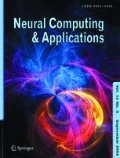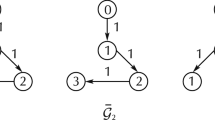Abstract
For a class of nonlinear multi-agent systems under switching topologies with disturbances, we propose a distributed H∞ consensus control protocol based on relative output feedback and utilize an iterative algorithm for solving nonlinear matrix inequality in this paper. Firstly, a consensus control protocol via relative output feedback is designed. Then, an iterative algorithm is utilized to calculate nonlinear matrix inequality. By this, the output feedback gain is designed but not chosen, which increases the design degree of freedom and meanwhile H∞ performance index γ is obtained. Finally, the proposed theory is applied to multiple simple-pendulums network systems driven by DC motors, and simulation results show the effectiveness of the designed consensus control protocol.






Similar content being viewed by others
References
Olfati-Saber R, Murray RM (2004) Consensus problems in networks of agents with switching topology and time-delays. IEEE Trans Autom Control 49:1520–1533
Ren W, Beard RW, Atkins EM (2005) A survey of consensus problems in multi-agent coordination. IEEE American Control Conference, In, pp 1859–1864
You KY, Xie LH (2011) Coordination of discrete-time multi-agent systems via relative output feedback. International Journal of Robust and Nonlinear Control 21:1587–1605
Liu Y, Jia YM (2011) Robust H ∞ Consensus control of uncertain multi-agent systems with time delays. International Journal of Control, Automation, and Systems 9:1086–1094
Miao GY, Wang Z, Ma Q, Lu JW (2013) Consensus of second-order multi-agent systems with nonlinear dynamics and time delays. Neural Computing & Applications 23:761–767
Yang SS, Liao XF, Liu YB, Chen X (2016) Consensus of delayed multi-agent dynamical systems with stochastic perturbation via impulsive approach. Neural Computing & Applications. doi:10.1007/s00521–016–2393-6
Jiang YL, Liu JC, Wang SQ (2014) A consensus-based multi-agent approach for estimation in robust fault detection. ISA Transactions 53:1562–1568
Jiang YL, Liu JC, Wang SQ (2014) Consensus tracking algorithm via observer-based distributed output feedback for multi-agent systems under switching topology. Circuits Systems & Signal Process 33:3037–3052
Liu Y, Jia YM (2010) H ∞ Consensus control of multi-agent systems with switching topology: a dynamic output feedback protocol. International Journal of Control 83:527–537.
Gao LX, Tong CF, Wang LY (2014) H ∞ dynamic output feedback consensus control for discrete-time multi-agent systems with switching topology. Arabian Journal for Science and Engineering 39:1477–1487
Lee DH, Joo YH, Kim SK (2016) A proposition of iterative LMI method for static output feedback control of continuous-time LTI systems. International Journal of Control, Automation and Systems 14:1–7
Belozyorov VY (2016) New solution method of linear static output feedback design problem for linear control systems. Linear Algebra and its Applications 504:204–227
Zhang DG, Wang XG (2012) Static output feedback control of networked control systems with packet dropout. International Journal of Systems Science 43:665–672
Yu WW, Ren W, Zheng W, Chen G (2013) Distributed control gains design for consensus in multi-agent systems with second-order non-linear dynamics. Automatica 49:2107–2115
Lin P, Jia YM, Li L (2008) `Distributed robust H ∞ consensus control in directed networks of agents with time-delay. Systems & Control Letters 57:643–653
Wen GH, Duan ZS, Ren W, Chen GR (2013) Distributed consensus of multi-agent systems with general linear node dynamics and intermittent communications. International Journal of Robust and Nonlinear Control 24:2438–2457
Olfati-Saber R, Fax JA, Murray RM (2007) Consensus and cooperation in networked multi-agent systems. In: Proceedings of the IEEE 95:215–233
Yu L (2002) Robust Control-LMI Method. Qinghua University Press, Beijing
Cao YY, Lam J, Sun YX (1998) Static Output Feedback Stabilization: An ILMI Approach. Automatica 34:1641–1645
Jiang YL, Wang SQ, Li YC, Liu DR (2016) Distributed consensus tracking control for multiple simple-pendulum network systems, In: 35th Chinese Control Conference (CCC), 7556–7560.
Author information
Authors and Affiliations
Corresponding author
Ethics declarations
Funding
This study was funded by the Natural Science Foundation of China (grant number 61503045, 61403044) and the Science and Technology of Education Department of Jilin Province (grant number 2016337).
Conflict of interest
The authors declare that they have no conflict of interest.
Rights and permissions
About this article
Cite this article
Jiang, Y., Wang, H. & Wang, S. Distributed H∞ consensus control for nonlinear multi-agent systems under switching topologies via relative output feedback. Neural Comput & Applic 31, 1–9 (2019). https://doi.org/10.1007/s00521-017-2975-y
Received:
Accepted:
Published:
Issue Date:
DOI: https://doi.org/10.1007/s00521-017-2975-y




